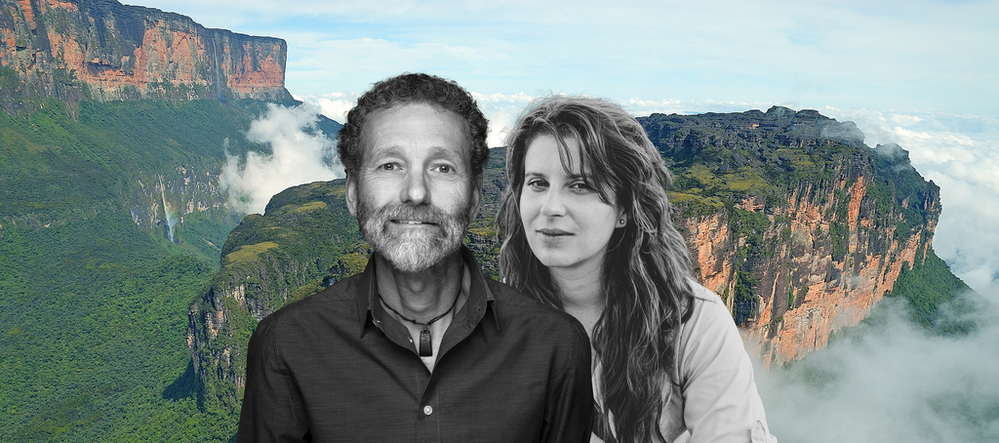
Researchers from the Faculty of Biology and Environmental Protection were in the field at the end of 2022 with a French filming crew to shoot a 52-min documentary about the Canaima National Park in southern Venezuela for a TV series called “Saving Paradise” (partly produced by ARTE France). The documentary will soon be broadcast on European channels (including in Poland), but the University of Lodz received the authorisation from the film director and producers for a private projection for our staff and students.
Preview projection (a new date and location)
"Saving Paradise: Canaima and the Venezuelan tepuis"
Wednesday, 26 June at 1:30 p.m., Assembly Hall of building D of the Faculty of Biology and Environmental Protection (at Pomorska 141/143, entrance from Matejki)
The documentary is dubbed in English, there are no Polish subtitles.
The film shows a glimpse of the research of Dr Izabela Stachowicz in the uplands/lowlands of the park, and a glimpse of research of Prof. Philippe Kok on the upper slopes and the summit of Mount Roraima. The landscapes are breathtaking! The documentary is also about the threats to the national park and its flora/fauna, due to increasing tourism, gold mining and associated pollution, etc.
The real cost of gold
The film is an excellent follow-up of two lectures our scientists delivered as part of the 'Science inspires' project a few months ago. One of them is presented below, along with a commentary by Dr Izabela Stachowicz on the problems faced by Venezuela's nature under the pressure of human activity.
Our researchers conduct studies in some of the most biodiverse regions of the world. Unfortunately, these areas are increasingly engulfed in conflicts that jeopardize both the security of the research and the personal safety of the scientists. In this episode of “Science Inspire,” Dr Izabela Stachowicz discusses the profound impact of illegal gold mining on high biodiversity areas and ecological research in Venezuela.
With international demand for metals rising significantly in recent years, regions with the richest resources, predominantly located in the tropics, face new, devastating challenges. They affect both people and nature. This episode highlights the situation in southern Venezuela, part of the Guiana Shield, where Dr Stachowicz is conducting her research. Through her insights, we explore the complex interplay between illegal mining activities and the quest for sustainable solutions.
A strip of mines through the middle of the forest
Venezuelan government decided to designate 112,000 km² of tropical rainforest and indigenous land as the Orinoco Mining Arc (OMA) in 2016. Its objective was to regulate mineral mining. But instead, it has sparked a surge in illegal mining activities, threatening the country's rich biodiversity, indigenous communities and scientific research. The establishment of OMA has led to extensive mining activity in the Guiana Shield, one of the world's most biodiverse regions. Mining has become the most important reason of deforestation in Guiana Shield causing more than 90% of total deforestation. This mining boom has devastating effects on ecosystems in protected areas like Canaima and Caura National Parks. It has even affected sacred tepuis, which has been revered by Indigenous communities for centuries. You can read more about this in a letter by Izabela Stachowicz published in Science.
Mines are becoming a source of violence
Mining companies do not conduct studies on the environmental impact of their mines and violate the rights of 14 Indigenous Nations. The resulting habitat destruction and pollution severely disrupt local wildlife, complicating conservation efforts Illegal mining not only damages the environment but also exacerbates violence and public health issues. Armed groups and syndicates fight over mining control, leading to increased violence, child labour, and modern slavery. Malaria cases have surged in mining areas, further straining public health systems. The real cost of gold mining is overpowering. You can get more information from the Drzazgi świata podcast.
Researchers like Dr Izabela Stachowicz, who have been studying biodiversity in Canaima National Park, face significant challenges. Working in conflict affected areas presents formidable challenges for researchers due to the volatile and unpredictable nature of these environments. Risks to personal safety, limited access to the population of interest, and constraints on traditional research methods are common hurdles faced by researchers More information in the publication where the context of working in difficult areas is described.
Scientists do not give up
Despite these challenges, ecological research does not stop, and researchers strive to find joy and fulfilment in their work. Modern methods, such as combining camera trap data with opportunistic sightings, help researchers adapt to difficult conditions. These approaches maximize available data and provide insights into how species respond to habitat disturbances like deforestation and fire (for more information, see an article that has been recently published in Scientific Reports).
To mitigate these impacts, international monitoring of Venezuela's mining activities is crucial. The Venezuelan government must collaborate with neighbouring countries to eliminate the illicit gold market and engage with civil society and scientific communities to develop effective conservation strategies.
Protecting high biodiversity areas like Canaima National Park from the ravages of illegal mining is essential for preserving Venezuela's natural heritage and supporting ongoing ecological research. This requires not only a coordinated effort to safeguard these invaluable ecosystems but also the scientific work dedicated to their conservation.
Source: Dr Izabela Stachowicz (Department of Geobotany and Plant Ecology, University of Lodz), Prof Philippe Kok (Faculty of Biology and Environmental Protection, University of Lodz)
Edit: Michał Gruda (Communications and PR Centre, University of Lodz)
The mission of the University of Lodz is to conduct reliable research and actively disseminate facts and research results so as to wisely educate future generations, be useful to society and courageously respond to the challenges of the modern world. Scientific excellence is always our best compass. Our values include: courage, curiosity, commitment, cooperation and respect.
